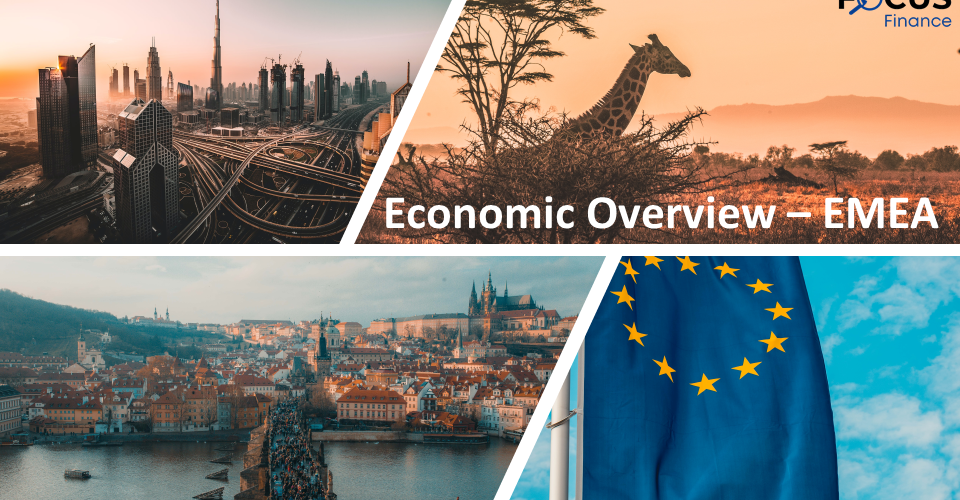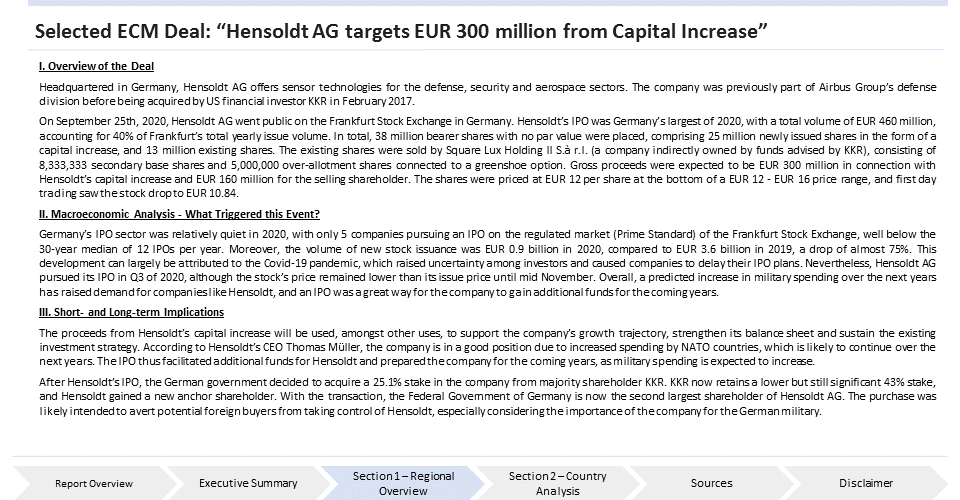EMEA- Economic and Capital Markets Overview
- Focus Finance
%20-%20Copy.png/v1/fill/w_320,h_320/file.jpg)
- Mar 26, 2021
- 8 min read
Division Head: Timur Kurbanov (NYU Shanghai), Co-Head: Charlie Solnik (California Polytechnic State University); Analysts: Nicolas Bojenko (University of Sussex), Max Rosmuller (University of St. Gallen)
Click on the image to read the full report.
Brexit
On the 23rd of June 2016, a referendum was held in the UK which gave British citizens the choice to either remain as an integral part of the European Union or deviate from that alliance and become a separate entity. After votes were counted, 51.89% of voters choose to leave the EU, this process officially took effect on the 31st of January 2020. It was since then, nicknamed “Brexit”, from the combination of “Britain” and “Exit”.
Brexit’s impact has had an impact both on the EU as well as the UK, although the procedure has taken several years to come into effect, some of its consequences already appeared in the meantime. Whilst it took almost 8 months of negotiations to concur on a trade agreement, the EU-UK Trade and Cooperation Agreement was signed on the 30th of December 2020, it’s most essential part links both parties to a free trade agreement covering goods, services and investment opportunities amongst others. Brexit’s first effect on the region was felt by a weakening British pound from 2016 up to today, for instance, it’s maximum value in those 4 years was at 1.3330 in January 2016, plummeting to its lowest at 1.0754 in March 2020. Considering the weakening of the pound affects the UK mainly, it is fair to mention that the European counterpart will suffer some of the consequences of such move as well. Countries like Romania, Estonia and Poland, for example, have seen steady rise in immigration to the UK, which is primarily due to the opportunities and freedom of movement and work given by the European Union. Those opportunities might now be inhibited, or at least, working immigration outflow from Eastern Europe to the UK will be greatly reduced. This might result in Eastern European citizens losing their right to work in the UK, and thus will be forced to look for working opportunities elsewhere in the EU.
As of today, it is clear that investor confidence was greatly shaken by the Brexit Referendum. This uncertainty can be noticeable in the M&A sector, where transactions processes tend to take “longer”, this is to do with investors attempting to analyse the new, post-Brexit environment that might be created, and potentially chose to either continue or divest their current plans. However, those issues occur in the immediate-to-short term, in the long-run, far more firms and investors are considering potential M&A opportunities in the UK as a target destination than abroad, according to research conducted by Deloitte.
Covid-19
Covid-19 is the name given to a strand of infectious virus that first originated in the Chinese city of Wuhan at the end of 2019. The virus appears particularly contagious and affects the respiratory system of infected individuals. The fast spread of the virus and the severe health consequences that can appear as a result of it spread fear worldwide and resulted in numerous countries declaring self-isolation measures at home, travel bans, work from home routines, alongside other measures to contain the proliferation of the virus. As people were locked home, many industries suffered severe economic consequences from the virus, leading the world to a new era of economic recession.
As the world appeared particularly unprepared to such an outbreak, the economic effects of the virus appeared particularly significant. Whilst unemployment in the EMEA region rose, due to companies’ restructuring needs, governments across the region further indebted themselves to combat first-hand liquidity issues. The European Central Bank (ECB) for example, put in place the €1,850 billion “Pandemic Emergency Purchase Programme” (PEPP) to help citizens, firms, governments and other institutions access funds with lower borrowing costs to offset the financial distress created by such economic crisis. Although these so called “stimulus packages” offered by countries individually and the ECB helped absorb some part of the Covid-19 economic impact, financial markets have seen serious declines in 2020. The price of the French index CAC 40 for example has dropped from 6,111.41 to 3,632.06 from February to March 2020. A similar drop was noticeable in the FTSE 100 index during the same period, from about 7,400 to 4,993, or in the German DAX index from 13,664 to 8,441.17. Although since the end of March 2020 those indices have steadily gained in value, it just shows how impactful the impact of Covid-19 was on European financial markets. This volatility was due to the inactivity of many sectors, resulting from almost dormant industries such as restaurants, retail businesses, commercial airlines, the oil and gas sector, and leisure facilities in particular. When customers are scarce and consumption is at an all time low, most SME simply cannot survive sustained absence of clientele, and going bankrupt appears like a more viable solution. Eurostat announced that in the second quarter of 2020, new business registrations saw a significant drop, those were steadily increasing from 2015 onwards, but Covid put a halt to that phenomenon.
From the standpoint of M&A transactions, Covid had a mixed influence in the EMEA region. In Q1 of 2020 deal volumes appeared to have dropped by 33% from Q1 2019, although quite interestingly, whilst the remaining transactions mainly concerned large cap ones, the total value of M&A deals went up 26% from Q1 2019. Essentially, whilst Europe’s M&A volume dropped, the total value went up. 2020 appeared to be the year for acquisitions of new technology and IP as 88% of dealmakers agreed this sector was the primary deal driver of that year. Although 2020 distorted the M&A scene, many companies are acquired in situations of financial distress, which was prominent in crisis times under Covid.
Israel-UAE normalization agreement
The situation in the Middle East has been quite complicated. Various powers have different goals in mind, and the Israel-Palestinian conflict does not help see through the mist. However, the Israel-UAE normalization agreement, a historical US-backed peace deal that was signed at the White House in September 2020, appears as a rigorous and calculated step to create a hub collaboration and friendship, much needed in the current climate there.
This move is quite important for several reasons: 1. The UAE becomes the third country to agree to normalize its relationship with Israel after Egypt and Jordan. On its side, Israel agreed to put a hold on its plans to annex parts of the West Bank. It seems that the relationship between Gulf countries and Israel are slowly warming up throughout the years, as countries appear to create a hub of collaboration against a common enemy, Iran. 2. A normalization of relations means several creates more opportunities for trade and bilateral relations to be established. Not only in terms of advanced weapons such as fighter jets and electronic warfare aircrafts for national defence purposes but also for general tourism and cultural exchange between both countries. 3. Israel can only win from such a peaceful relationship, it lessens its regional isolation and creates more opportunities for the future, where a global trade hub between Israel and the Muslim world can thrive. Normalization in general also encompasses both countries building embassies in each other’s regions, creating a place for dialogues and in general, a step closer to peace in the Middle East. In terms of economic benefits Israel estimates that trade with UAE could total $4 bn a year and create 15,000 jobs. However, this seemingly peaceful situation is seen negatively by the Palestinians who see the UAE’s step as a “betrayal” in their fight for sovereignty and freedom from Israeli rule. Palestine and Palestinians expected fellow Arab countries to wait for Palestinian independence before making “official peace”.
For the M&A industry, this move appears powerful, mainly because normalization of relationships effectively means a normalization in affairs and business operations. Israel’s main industries operate around Computing software, Pharmaceutical products, Electrical components and R&D. The Oil and gas sectors are particularly dominant in UAE’s economy, whilst the services sector has been rapidly expanding as well, it is focused around tourism, with the building of hotels, luxury vacation opportunities, beaches, etc, … Although the M&A industry has not been affected by this peace deal yet, it certainly will in the future. A more cooperative environment always promotes a healthier development in affairs, and in this case in the various M&A opportunities that can be created in such differing countries. In other words, each countries’ wealth lies in different sectors, and as trade will regain a certain amplitude, M&A transactions will follow naturally.
EU Digital Services Act & Digital Markets Act
As businesses become increasingly digitized and the majority of our daily personal lives tap into digital platforms, a rising awareness surrounding so-called “Big Tech” has emerged. Tech giants like Amazon, Apple, Facebook, Google and Microsoft have been under increasing scrutiny regarding their rapidly growing influence and power, which according to the EU results in anti-competitive practices. The European Commission has therefore proposed two legislative initiatives, the Digital Services Act (DSA) and the Digital Markets Act (DMA), to combat this development.
Generally speaking, the DSA and DMA both aim to regulate the growing influence of Big Tech. More specifically, however, the DSA will address transparency related matters while the DMA addresses anti-competitive behavior in the digital market. Transparency surrounding the algorithms used to rank user content or how content is recommended to users will be demanded by the DSA . Additionally, the act will hold technology companies liable if they do not take action against illegal content posted by users. The DSA will apply to platforms with more than 45 million users, such as Facebook, YouTube, and Instagram. Non-compliance could lead to fines of up to 6% of global annual turnover and the DSA will also provide the Commission with the ability to discontinue advertising revenue for specific content, among other actions. On the other hand, the DMA will apply to companies that are defined according to various criteria as “gatekeepers”, or in other words, as having the ability to dictate the marketplace. In short, three main provisions result from the act. Firstly, “gatekeeper” companies are required to act fairly with regard to using competitor data; data from competitors may not be used to disadvantage them. In addition, the DMA will enforce interoperability, providing the ability for users to take their data elsewhere while still being able to benefit from the platform’s services. Lastly, the DMA dictates that “gatekeepers” are prohibited from unfavorably treating competitors using their platforms over their own. For instance, by not ranking their own services higher than competitors’ in a search algorithm. Non-compliance with the DMA will result in fines of up to 10% of the company’s worldwide annual turnover. In the case of systematic infringements, businesses may be required to be divested. Overall, the DSA and DMA aim at creating transparency in a market dominated by a few powerful corporations, while cracking down on anti-competitive behavior resulting from monopoly-like “gatekeepers” dictating the digital landscape.
In addition to the provisions described above, the proposed acts will require “gatekeepers” to inform the European Commission on intended mergers and acquisitions concerning other providers of digital services. This is a requirement regardless of whether the transaction needs to be reported under the current EU Merger Regulation or EU Member States’ merger rules. The DMA and DSA will thus allow the European Commission to have greater surveillance over transactions that would, in the past, fall outside its jurisdiction. Overall, one can see early developments of a more regulated and supervised M&A environment for large technology corporations. Although the DSA and DMA are not specifically proposed to regulate M&A transactions, as they cover wider aspects of the current problems surrounding Big Tech, it is inevitable that the M&A landscape will change significantly in the coming years. Overall, anti-competitive practices by Big Tech companies will surely create incentives for governments to regulate their M&A prospects in order to ensure that smaller technology companies have the chance to achieve growth and ultimately innovate in a market which until now has been dominated by only a few. The DSA and DMA are early examples of what’s to come.
Read the full report here.






















Comments